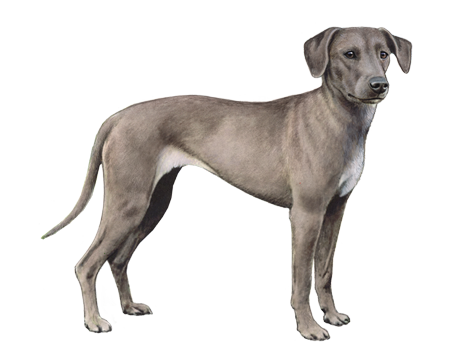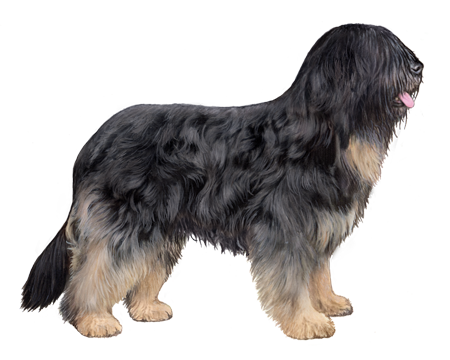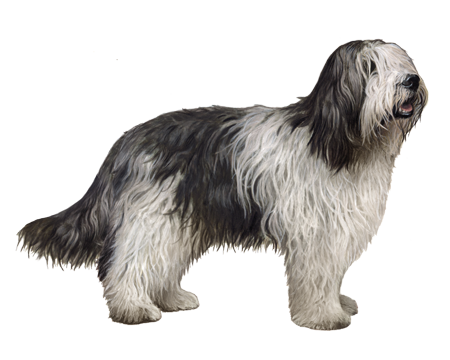
Belgian Sheepdog
Belgian Sheepdogs are serious and sensitive dogs with a passion for working and companionship. The breed works as hard to earn affection as it does to herd sheep.
Interested in discovering if your dog is a Belgian Sheepdog?
Check out Wisdom Panel's DNA tests.

Belgian Sheepdog Traits
General Appearance
Belgian Sheepdogs are muscular dogs with alert, attentive expressions and powerful gaits. Males tend to be grand and impressive while females appear more feminine. In both sexes, the topline, front legs, and back legs are in line, giving Belgian Sheepdogs a shape that approximates a square.
Coat and Coloring
The Belgian Sheepdog is a double-coated breed with a dense undercoat befitting its climate and a long, straight, and abundant outercoat of medium harshness. The hair is shorter on the head, outside of the ears, and lower parts of the leg; tufts of hair appear on the opening of their ears, providing protection from the elements. Elsewhere on their bodies, Belgian Sheepdogs have long hair around the neck, forming a collarette, and abundant fringe down the backs of their forearms, hindquarters, and tails.
Belgian Sheepdogs have black coats. Their hair might be completely black or black with white—as long as the white is limited to small to moderate patches on their chin, muzzle, forechest, between the pads of their feet, and on the tips of their hind toes. Their coats may turn a reddish shade due to the climate, which is not a disqualification according the breed standard.
Distinctive Physical Traits
Belgian Sheepdogs are well-balanced with withers just higher than their backs; deep chests; short, broad, strong loins; medium-length pasterns; and round, well-padded feet with the toes curved close together. Their tails are strong at the base and, in action, raised to a curl that is strongest at the tip without forming a hook. These dogs also have medium-sized, almond-shaped, brown eyes and triangular ears.
Belgian Sheepdog Temperament
Traits like intelligence, alertness, courage, and attentiveness are among the top reasons Belgian Sheepdogs make excellent working dogs. The breed is also affectionate and devoted to its owners, zealous for their attention. Belgian Sheepdogs do best in homes where they can spend a lot of time with their owners and be included in family activities.
Like all good guard dogs, Belgian Sheepdogs can be vigilant around strangers. These dogs are seldom vicious, but socialization and training can help them become more comfortable with unfamiliar people and overcome their tendencies to be possessive with their owners.


Belgian Sheepdog History
In Belgium, farmers used sheepdogs to herd cattle. There were eight original sheepdog varieties unique to the country but the number narrowed to four when the dogs were classified in the 1890s. Those breeds—Belgian Malinois, Laekenois, Tervuren, and Groenendael or Chien de Berger Belge—are identical expect for their coat textures, colors, and lengths. The American Kennel Club considers the dog known as the Groenendael to be the Belgian Sheepdog.
Demand for Belgian Sheepdogs spread across the world, as the dogs, known for being bright, watchful, and serious-minded with strong desires to work, have earned their keep in police K9 patrols, border patrols, drug detection, and search and rescue. In both World War I and World War II, Belgian Sheepdogs worked as messengers and ambulance dogs.
Belgian Sheepdog Care
Nutrition
Feed Belgian Sheepdogs a high-quality dog food that is appropriate for their life stage (puppy, adult, senior) and consider a diet formulated for active breeds. Portion out their food with a standard measuring cup and limit treats to no more than 10% of their daily calories to avoid overfeeding.
Grooming
Although Belgian Sheepdogs have long hair, the breed does not require extensive grooming. Brush their coats at least once per week to remove dead hair and prevent matting. Belgian Sheepdogs shed heavily during semi-annual “shedding seasons” and daily brushing is essential to remove all the dead hair. Baths are only required if Belgian Sheepdogs get into something messy.
Clean their ears and trim their nails to prevent cracking, splitting, and painful overgrowths. Regular dental care that includes at-home teeth brushing and professional cleanings is also an essential part of their grooming routines.
Exercise
Like other working dogs, Belgian Sheepdogs require a lot of exercise. These smart, active dogs enjoy activities such as hiking and running as well as dog sports like agility, tracking, herding, and obedience.
Belgian Sheepdogs need human companionship as much as exercise. Rather than telling them to “go play” in a fenced yard, Belgian Sheepdog owners must be prepared to engage with their pets. Play games like hide-and-seek, throw a ball, or race through a DIY agility course in the yard. In addition to high-intensity physical activity, provide mental stimulation, puzzle toys, or other interactive games.
With too much time alone and too little exercise, the breed can develop behavior problems.
Training
Belgian Sheepdogs are intelligent and eager to please, making them a pleasure to train. Skip harsh training methods in favor of positive reinforcement and rewards. In addition to helping Belgian Sheepdogs master basic commands and learn new tricks, consistent training also provides important mental stimulation. Regular socialization can encourage Belgian Sheepdogs to be more accepting of strangers and lessen their protective instincts.

Belgian Sheepdog Genetic Health Conditions
-
CNS Atrophy with Cerebellar Ataxia (Discovered in the Belgian Shepherd)
CNS Atrophy with Cerebellar Ataxia (CACA) is a neurological condition characterized by uncoordinated movements and intention tremors beginning at two weeks of age. The associated genetic variant has been identified in the Belgian Shepherd.
-
Cardiomyopathy and Juvenile Mortality (Discovered in the Belgian Shepherd)
Cardiomyopathy and Juvenile Mortality is an inherited condition associated with the death of young puppies following nonspecific signs of illness. The associated genetic variant has been identified in the Belgian Shepherd.
-
Spongy Degeneration with Cerebellar Ataxia (Discovered in Belgian Malinois - SDCA1)
Spongy Degeneration with Cerebellar Ataxia (SDCA) is an early onset disease of poor coordination, muscle twitching and seizures.
Knowing if your Belgian Sheepdog is a carrier or at-risk for these conditions can help you and your veterinarian plan for your pup’s lifelong care. With Wisdom Panel™ Premium, you can get results for over 200 genetic health tests.
Breed Group
Herding
The herding group is a diverse category. These highly intelligent breeds were developed to guard and control the movement of livestock.
Resources
https://www.akc.org/dog-breeds/belgian-sheepdog/
http://images.akc.org/pdf/breeds/standards/BelgianSheepdog.pdf
Reviewed July 26, 2020 by Laura Inman, DVM























































